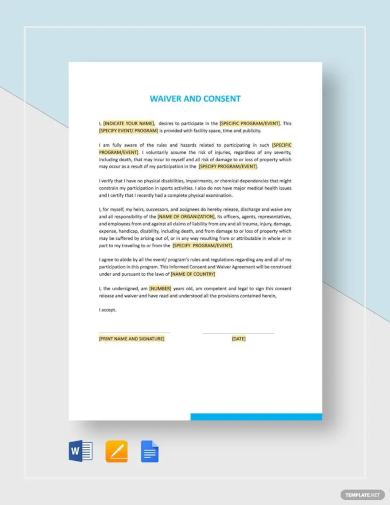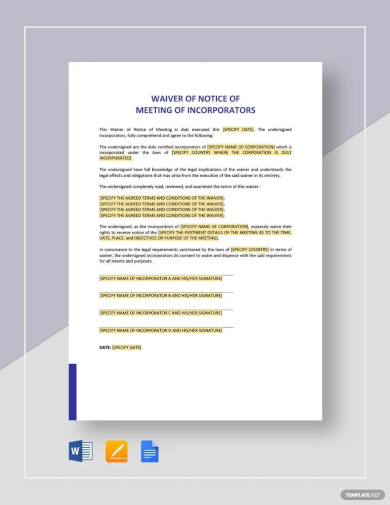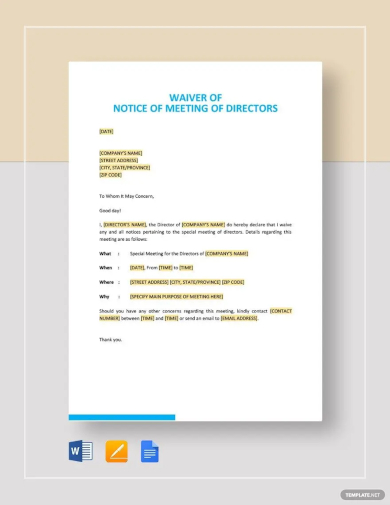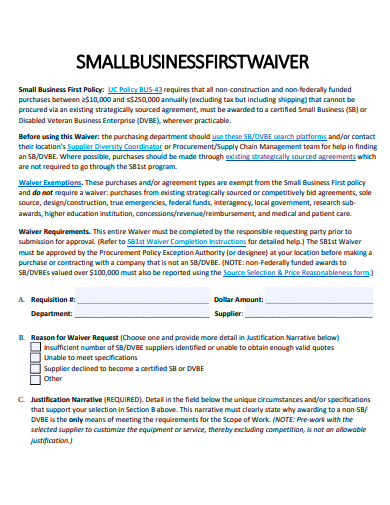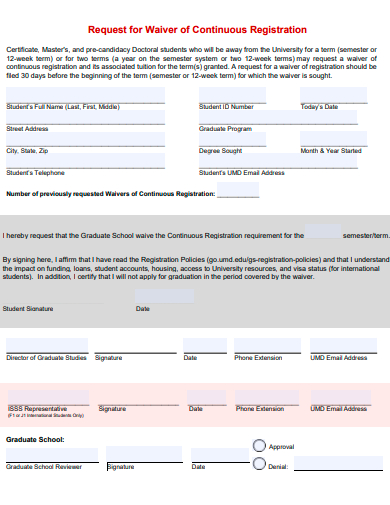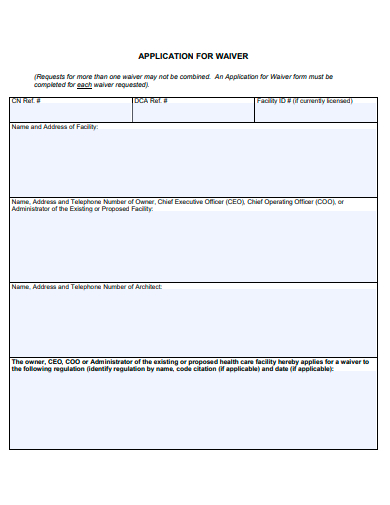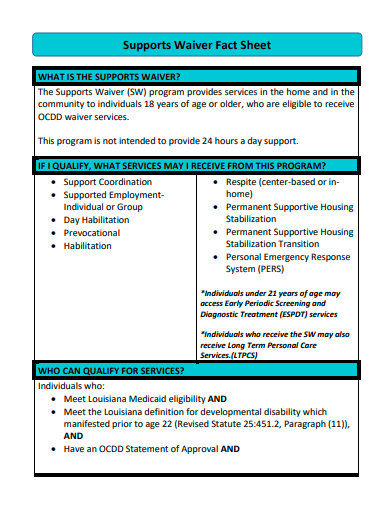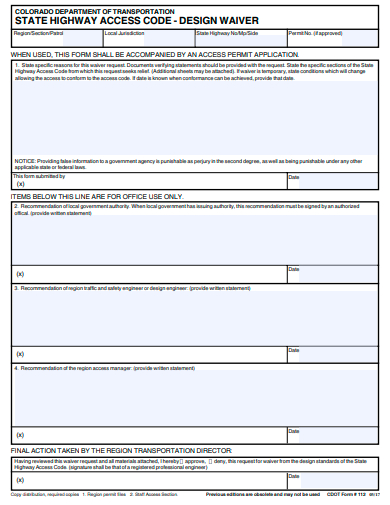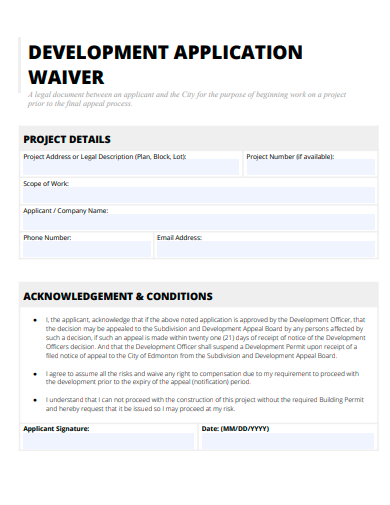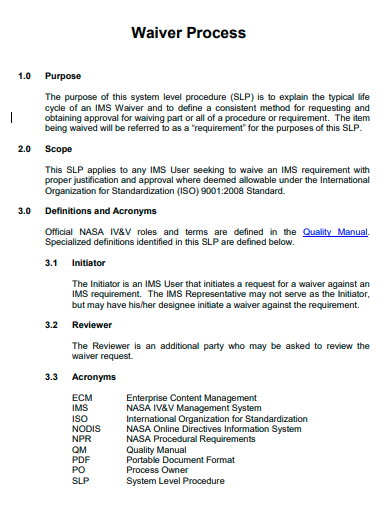Operating a business involves being exposed to possible risks that always come with any type of activity. Signing a liability waiver is an important factor that ensures that both employees and customers accept the risks associated with purchasing a product or service. This document also releases the company or organization from any form of liability in case an individual gets injured during the proceedings of a particular activity.
30+ Waiver Samples
1. Waiver and Consent Template
2. Waiver of Notice of Meeting of Incorporation Template
3. Waiver of Notice of Meeting of Directors Template
4. Waiver Declaration Template
5. Sample Waiver Policy Template
6. Fee Waiver Request Template
7. Small Business First Waiver Template
8. Continuing Education Waiver Request Template
9. License Fee Waiver Application Template
10. Apprenticeship Utilization Act Waiver Request Template
11. Request for Waiver of Continuous Registration Template
12. Sample Summer Enrollment Requirement Waiver Template
13. Sales Person Education Waiver Application Template
14. Waiver of Statutory Registration Template
15. Application Fee Waiver Checklist Template
16. Sample Fee Waiver Request Form Template
17. Waiver of Final Consent Template
18. Basic Waiver Template
19. Petition For Waiver Template
20. Profile Waiver Request for the Noncustodial Parent Template
21. Application For Waiver Template
22. Supports Waiver Fact Sheet Template
23. Pass-Through Entity Tax Electronic Filing Waiver Request Template
24. Waiver Application Form Template
25. Design Waiver Template
26. Development Application Waiver Template
27. Religious Waiver Request Template
28. Waiver Process Template
29. Request For Waiver of Assessment Template
30. Real Estate Waiver Request Template
31. Presidential Waiver Policy Template
What is a Waiver?
A waiver is a legal and formal document that provides protection to businesses by reducing liabilities and risks. This is a contract agreement between a particular company and its customers, certifying that the parties involves acknowledge and accept the potential risks that come with purchasing the services and products offered by the company. Waivers are also referred to as waivers of liability agreement, hold harmless agreements or release forms. These forms are commonly used for extreme activities like sports and recreational activities.
How to Create a Waiver
Waivers are utilized by businesses when they provide risky activities to their customers which leaves the possibility of exposure to liabilities if a certain customer is injured and makes a claim against the company. This document also warns and alerts the customer on the nature of the activity they will be participating in and waive their right to take action against the organization or business. Other legal agreements you can use include lien waiver forms, affidavit of waiver, and waiver of moral rights.
Step 1: Conduct Research on Industry Standards
Collect essential information on the details of liability waivers that your competitors in the industry utilize. This will ensure that have included all possible risks and are following the best practices you must perform.
Step 2: Learn More About the Law
Make sure to research the law in your region of operation. The relevant laws in making waivers change based on the state or country you are operating in. Before you start drafting your waiver, make sure you have a clear understanding of the law in your jurisdiction.
Step 3: Talk with a Lawyer
Consider talking with business lawyers when making a draft of your liability waiver for your business. Lawyers are knowledgeable about the precise and clear language to be used to ensure the legality of your waiver.
Step 4: Make Sure that Your Participants are Well-Informed
After drafting, reviewing, and finalizing your waiver, make sure that your participants are not forced to sign the documents. Give them enough time to consider and carefully read through the waiver before willingly signing it.
FAQs
What are the common contents of a liability waiver?
The liability waiver commonly contains sections that have essential information like caution to the participants, activity risks, voluntary assumption of risk, release clause, indemnity agreement, and waiver laws.
What elements should be included in a waiver form?
A waiver form should include informative elements such as the name of the business or event, a description of the risks that come with the event, a release of liability statement, and the signature of the customer or participant.
What are the different types of liability waivers?
The various types of liability waivers are the accident liability waiver, activity participation waiver, contractor liability waiver, general liability waiver, mutual liability waiver, personal injury waiver, and property liability waiver.
A waiver is a legally binding document in which the parties involved accept and agree to voluntarily waive a particular claim without the other party being liable. This document is commonly created or produced during settlement negotiations or when a party is willing to pay out a higher award given that the other party agrees to sign a waiver. Waivers commonly should be in writing and incorporated into the agreement or contract with the customer, containing a risk warning as well as an explanation of the risks associated with a particular activity by the business.
Related Posts
Sample Meeting Minutes Templates
Presentation Speech Samples & Templates
Ukulele Chord Chart Samples & Templates
Retirement Speech Samples & Templates
Weekly Schedule Samples & Templates
Contractual Agreement Samples & Templates
FREE 9+ Amazing Sample Church Bulletin Templates in PSD | PDF
Sample Business Card Templates
Sample Cashier Job Descriptions
Questionnaire Samples
FREE 10+ Sample HR Resource Templates in PDF
FREE 49+ Sample Job Descriptions in PDF | MS Word
FREE 23+ Sample Event Calendar Templates in PDF | MS Word | Google Docs | Apple Pages
Company Profile Samples
FREE 10+ Leadership Report Samples [ Development, Training, Camp ]

